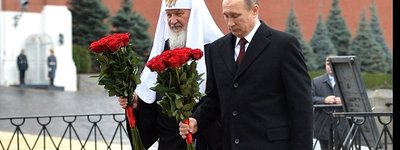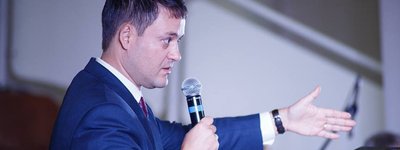Association Agreement would benefit Europe, says Filaret
An Association Agreement between Ukraine and the European Union would benefit not only the Ukrainian Orthodox Churches, but European society as well. This was one of the points that Patriarch Filaret of the Ukrainian Orthodox Church (Kyiv Patriarchate) made during a luncheon address last Thursday at the Heritage Foundation in Washington, DC, co-hosted by the US-Ukraine Foundation. The hierarch also pointed out that in combination with the European Union and the United States, Ukraine could effectively resist Russian aggression.
The 83-year-old patriarch, whose ecclesiastical career over more than six decades has seen the extremes of triumph and humiliation, has called on the European Union to accept Ukraine despite the continued imprisonment of former Prime Minister YuliaTymoshenko. Although Filaret has twice called for Ms. Tymoshenko’s release, he does not believe that this factor should be allowed to block Ukrainian accession to the European Union. An Association Agreement, he argued, would in fact compel Ukraine to adopt European judicial standards, forcing it to release the unjustly and selectively prosecuted Ms. Tymoshenko.
Naturally, noted the hierarch, Ukrainian Orthodox do not agree with everything that the European Union does. For example, as he recently stated in Brussels, they would oppose same-sex marriage. In this they would be joined, among others, by the Jewish community.
Nonetheless, stressed Filaret, an Association Agreement is necessary as a first step towards integration with Europe. To postpone it, as some have suggested, would only give Russia more time and opportunity to pressure Ukraine to join its Customs Union instead.
The patriarch also observed that the Ukrainian Churches would benefit from an Association Agreement. For one thing, it would place the Ukrainian Orthodox Church of the Moscow Patriarchate (UOC-MP) in a new situation. With Ukraine committed to Europe and continued independence, that Church would have to decide which side it was on – that of Russia, or that of the Ukrainian people. By siding with Russia, the UOC-MP would assume the role of a fifth column for a hostile state. If, on the other hand, it sided with the Ukrainians, it would be obligated to unite with the Ukrainian Orthodox Church of the Kyivan Patriarchate (UOC-KP) into a single Ukrainian Orthodox Church, independent of Moscow.
In the latter process, continued Patriarch Filaret, the Ecumenical Patriarchate in Istanbul could help, by recognizing the autocephaly of the UOC-KP. This would dispose of the UOC-MP’s objection that its rival is not a canonical Church. According to Filaret, a united Ukrainian Orthodox Church would have more parishes than the Russian Orthodox. This would restore a proper balance in the Orthodox world, for the Ukrainian Church – unlike the Russian – would support the primacy of the Ecumenical Patriarchate.
In response to a question, Patriarch Filaret pointed out that the entry of Ukraine into the European Union would also change the moral balance of forces on the continent. With its rapid secularization, withering Christian Churches, and burgeoning Muslim population, Europe could benefit from the presence of a vital andpopulousUkrainian Orthodox Church.Given Ukrainian traditions of tolerance and religious diversity, such a Church could also have a positive influence on inter-religious relations. And it would reinforce universal human values of freedom and democracy.
Thus, Patriarch Filaret demonstrated that an Association Agreement between the European Union and Ukraine would benefit both sides. He offered a vision of a Europe in which Ukraine could play an important spiritual and cultural as well as geo-political role. In this perspective, he exposed the Moscow Patriarchate’s recent overtures to Roman Catholics, purportedly tostem the tide of secularism, as an instrument of the Kremlin’s foreign policy. His concept of a Europe enriched by Ukrainian Christianity and its heritage of freedom and democracy is far more compelling – and realistic.










